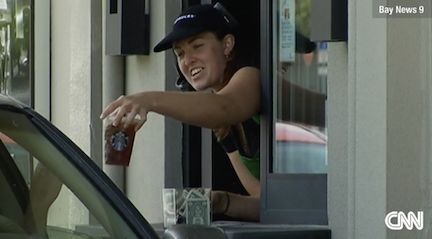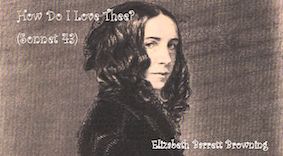Who's Your Bouncer? Perfect Love Bounces Fear to the Curb
At exclusive events, there's a head of security, affectionately known as a "bouncer." He gets to decide who's in and who's out, who gets to stay and who has to leave.
It's reasonable to expect that even the best of bouncers will sometimes let bad characters past the gate. But it's just as reasonable to expect that anything or anyone creating trouble or disruption will promptly be booted to the curb.
The patrons and participants are then able to enjoy the event, free from the fear.

Likewise, our spiritual lives need a gate keeper, a bouncer ready to kick to the curb anything which might cause us to fear.
Since God has no one or nothing to fear, He loves completely and perfectly! In making that love known and available to us, He equips us with all the pieces we need to love one another. This is possible no matter how scary it may seem to exercise that love. How great of God to make this possible!
John tells us that "perfect love casts out fear" (1 John 4:18). This is the principle upon which we have the confidence/boldness to stand before God on judgment (4:17). Since God's love for us is so thorough, and He has made it known to us (4:7-15), we are able to live it out with Him living among and within us (4:16). Because we're living out God's character (love) today, we have confidence before him at that final day (4:17).
Therefore, anytime fear threatens to keep us from loving — and love is difficult, so fear will attempt it often! — we boot it out, bounce it to the curb! When we allow God's truth to be our "bouncer" (see 4:1), then we invite his love more and more into our lives. When fears sneak in, even when we don't want them to, and they cause a scene, we cast them out. And we do it through the practice of love.
To choose our own desires or act in self-preservation is to give more and more power to fear. Choosing to act in love is an exercise of supreme trust in God. There can be no trust where fear abides.
Bounce it to the curb!
Pay It Forward In Big and Small Ways
Imagine that you are in line at a coffee shop, and the person in front of you offers to pay for your drink. Inspired by their kindness, you then offer to pay for the drink of the person behind you. This chain continues as each person pays for the drink of the person behind them, creating a chain of kindness that benefits everyone in line.

Well, one of the longest such "pay-it-forward" car lines in history actually happened at a St. Petersburg, Florida, Starbucks back in 2014, when some 750 cars kept the chain flowing over the course of two days.
“It was a pleasant surprise. Everyone likes their coffee paid for. So it was nice,” one customer told CNN affiliate Bay News 9.
Small acts of kindness can have quite a ripple effect. They can inspire others to do the same, simply for the sake of blessing another, without any expectation of receiving anything in return.
We don't need to be in a coffee line, though, to bless those coming up behind us. We can be constantly on the lookout for opportunities to show kindness to others, even in small ways. This can include offering to help a neighbor with their groceries, holding the door open for someone, or simply smiling and saying hello to a stranger. By doing so, we can create a positive impact in the lives of others and contribute to a chain of kindness that can benefit our communities and beyond. That's the ripple effect. Even small gestures can have BIG impact.
"So in everything, do to others what you would have them do to you, for this sums up the Law and the Prophets" (Matthew 7:12, NIV).
"And let us consider how to stir up one another to love and good works ... " (Hebrews 10:24, ESV).
How Do I Love Thee?
Elizabeth Barrett Browning, the English Romantic poet, is known for the first line of Sonnet 43.: “How do I love thee? Let me count the ways.” She was reared with privilege, wealth, and the finest education, but her health was compromised by an equestrian accident.
When she eloped to marry Robert Browning, her controlling father disinherited her. She published many works of various types throughout her life, and this allowed her to become independently wealthy despite her poor health.
Robert became enamored with her writing, and they corresponded for two years. During this time, she wrote poems expressing her fervently love for Robert. For all that she wrote in her relatively brief life, her poetry stands out, especially Sonnet 43.

The title above Psalm 92 reads, “a song for the Sabbath day.” That connects its words to worship, and this psalm shows the writer’s deep adoration for God. He never uses the word “love,” but his affection for God is obvious. It seems that the writer gives several proofs of that love here. Notice how.
- HE GIVES THANKS TO THE LORD (1)
- HE SINGS PRAISES TO HIS NAME (1,3-4)
- HE DECLARES HIS LOVINGKINDNESS AND FAITHFULNESS (2)
- HE PRAISES GOD’S WORKS AND THOUGHTS (5,8)
- HE SCORNS THE WICKED WHO OPPOSE GOD’S WAY (6-7,9,11)
- HE APPRECIATES THE BLESSINGS OF A GOD-APPROVED LIFE (10,12-14)
- HE EXPRESSES CONFIDENCE IN THE CHARACTER OF GOD (15)
One of the most rewarding exercises you can engage in is to enumerate the ways you love and appreciate God. Do it in your prayer life; spend time praising God and be specific in expressing your adoration and admiration. Think deeply about it. Look around. Look into your life. Consider what looks like His providence in your life and the life of others. Count your blessings, and tell God what you are thankful for. Wait! Did you mention running water, hot water, reliable vehicles, paved roads, coffee, air-conditioning, music, puppies, baby’s breath, eyesight, and brisket? What about the church, salvation, prayer, the Bible, peace, the hope of heaven, His guidance and protection, the elders, deacons, Bible teachers, your spouse, your parents, and your children?
This will build your love and appreciation for God. It will remind you of how much He loves you and cause you to love Him more. It will humble you and help you focus on the fount of your every blessing! It should make you a better, more obedient servant for Him. How do you love Him? Like this psalmist, count the ways! It will lift your spirit and open your eyes to a harvest ripe with those who need what you have. Get counting!